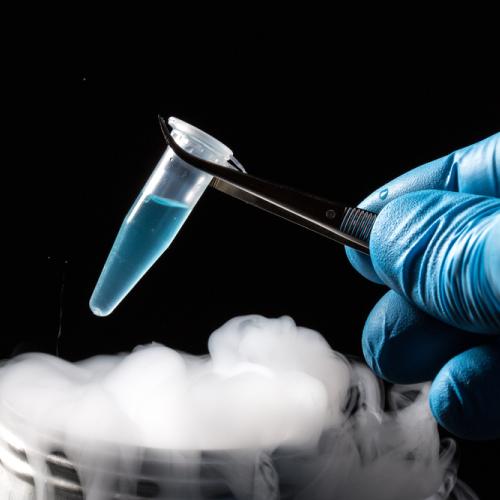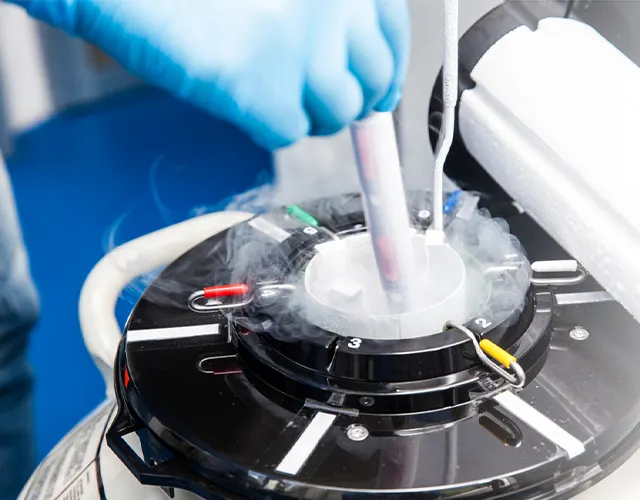Kanaa Fertility Centre offers advanced embryo freezing services as part of our comprehensive fertility preservation options. Whether you’re postponing parenthood or preparing for treatments that may affect fertility, embryo cryopreservation provides the flexibility to grow your family on your own timeline and terms. Book now!
Embryo freezing is a fertility preservation procedure where embryos created through IVF are frozen and stored for future use. Frozen embryos can later be transferred into the uterus through a frozen embryo transfer (FET). Embryo freezing is commonly used to preserve additional embryos, plan future pregnancies, reduce the need for repeated IVF cycles, or support medical and timing needs.
Embryo freezing is an important part of modern assisted reproductive technology and is commonly performed during IVF treatment. It allows couples to store embryos for future pregnancy attempts without repeating the entire stimulation and egg retrieval process.
Embryo freezing supports flexible fertility planning and improves treatment efficiency, especially when multiple embryos are created in an IVF cycle. Many couples also choose embryo freezing to plan future sibling pregnancies.
This page explains what embryo freezing is, how it works step by step, who it is recommended for, how embryos are stored and used later, and how frozen embryo transfer (FET) fits into the process.
Embryo freezing is a procedure where fertilized eggs (embryos) are stored at sub-zero temperatures using a process called vitrification. When ready, the embryo is thawed and transferred into the uterus during a future IVF cycle.
Embryo freezing is the process of preserving embryos created through IVF by freezing them at specific stages of development. These frozen embryos can be stored safely and used later for pregnancy through frozen embryo transfer. Embryo freezing is also known as embryo cryopreservation.
Unlike freezing eggs, where unfertilized eggs are preserved, embryo cryopreservation involves storing already-fertilized embryos, making it a more advanced solution for couples or individuals ready to fertilize and preserve the embryo immediately.
Embryo freezing is commonly done to:
Embryo freezing is now a standard part of many IVF cycles.
When excess embryos are made in an IVF cycle, in order to avoid the risk of OHSS, we may choose to freeze them all and replace them in subsequent months.

Embryo freezing may be recommended for:
If multiple embryos are created, freezing additional embryos allows future transfers without repeating the full IVF cycle.
Embryo freezing supports long-term family planning and future pregnancy attempts.
In some cases, doctors recommend freezing embryos and transferring them in a later cycle for optimal uterine conditions.
Embryo freezing may be used when fertility could be affected by treatments such as chemotherapy or radiation, especially for couples.
Embryo freezing occurs after embryos are created through IVF. Fertilization may be done through standard IVF or ICSI treatment, especially in male factor infertility cases.
Embryologists monitor embryo development in the lab for several days. Embryos are evaluated based on:
Only embryos that meet clinical standards are selected for freezing.
Selected embryos are frozen using advanced cryopreservation techniques under strict laboratory conditions.
This helps preserve embryo quality for future use.
Frozen embryos are stored securely in a controlled environment until they are needed for a future cycle.

Patient is seen on day 1 or 2 of periods.
We do a transvaginal scan to confirm the absence of any cysts.
Medication may be started in case of a hormonal cycle
Ultrasound monitoring of the endometrial lining is done starting about day 10 of cycle
Once the lining reaches a satisfactory thickness, progesterone is started,
Embryo transfer is planned after 3-5 days of progesterone depending on whether day 3 or day 5 embryos need to be replaced.
Embryo transfer is done under ultrasound guidance.
Luteal phase support with injections or medicines is advised for two weeks.
Beta hCG blood test is taken after 12 -14 days of transfer.
Frozen embryos are later used in a frozen embryo transfer (FET) cycle.
In FET:
FET is typically a simpler process compared to a full IVF cycle and does not require egg retrieval.
Embryo freezing outcomes depend on multiple factors, including:
Higher-quality embryos have stronger potential to survive thawing and implant successfully.
Egg quality is linked to age, which influences embryo quality.
Embryo freezing success depends heavily on the embryology lab’s expertise, protocols, and storage systems.
Even with healthy embryos, uterine lining and health affect implantation and pregnancy outcomes.
Both are fertility preservation options, but the key difference is fertilization.
Preferred for women preserving fertility independently
Embryo freezing offers several advantages:
Embryo freezing is considered safe and widely used. However:
Doctors guide couples based on individual factors and medical history.
Embryo freezing and FET are closely linked. Frozen embryo transfer is the process of placing a frozen embryo into the uterus for pregnancy.
Many couples choose embryo freezing because FET:
Often supports better uterine preparation
Embryo cryopreservation offers a powerful way to preserve future fertility. When you’re ready, the embryos are thawed and transferred to the uterus in a new IVF cycle—eliminating the need for repeated ovarian stimulation or egg retrieval. This streamlines the fertility journey and reduces physical and emotional stress.
Embryo freezing is a valuable option for preserving embryos created through IVF and planning future pregnancies. It improves treatment flexibility, reduces the need for repeated IVF cycles, and supports family planning goals.
A fertility specialist can guide couples through embryo freezing decisions and explain how frozen embryos can later be used through frozen embryo transfer for pregnancy attempts.
If you’re exploring embryo freezing to preserve your future fertility, Kanaa Fertility Centre in Chennai offers expert guidance, advanced lab support, and compassionate care. Learn how the embryo can be safely preserved through embryo cryopreservation and used in future IVF embryo transfer cycles. Book your consultation today.
Embryo freezing has been in common use since the 1980s and has been proven to be a safe and effective method, especially with the advent of vitrification.
There is a theoretical risk of embryos getting damaged or not surviving when thawed.,
As usually only good quality embryos are chosen to be frozen,the risk of damaging the embryos remains negligible in experienced hands.
There is no theoretical limit to the number of years where they remain viable but under the latest Indian law, storage is allowed for a period of ten years.
YES, World over there has been an increase in the number of frozen embryo transfers(FET) in the past decade.
Frozen embryo transfers are reported to give as good as and in many instances better pregnancy rates when compared to fresh transfers.
In case you have finished your family or do not want to renew storage for some other reason, you can choose to,
1. Discard the embryos.
2. Donate them for research or for training purposes.
This is usually covered in the consent form signed at the start of the process itself.
YES, Informed consent is taken from both partners before proceeding with freezing.
Consent is also taken about what to do in case there is the untimely death of one partner or in case of legal divorce.
Embryo freezing is part of IVF. Embryos are created through IVF and then frozen for later transfer.
Embryo freezing itself happens in the lab. The medical steps involved occur during IVF.